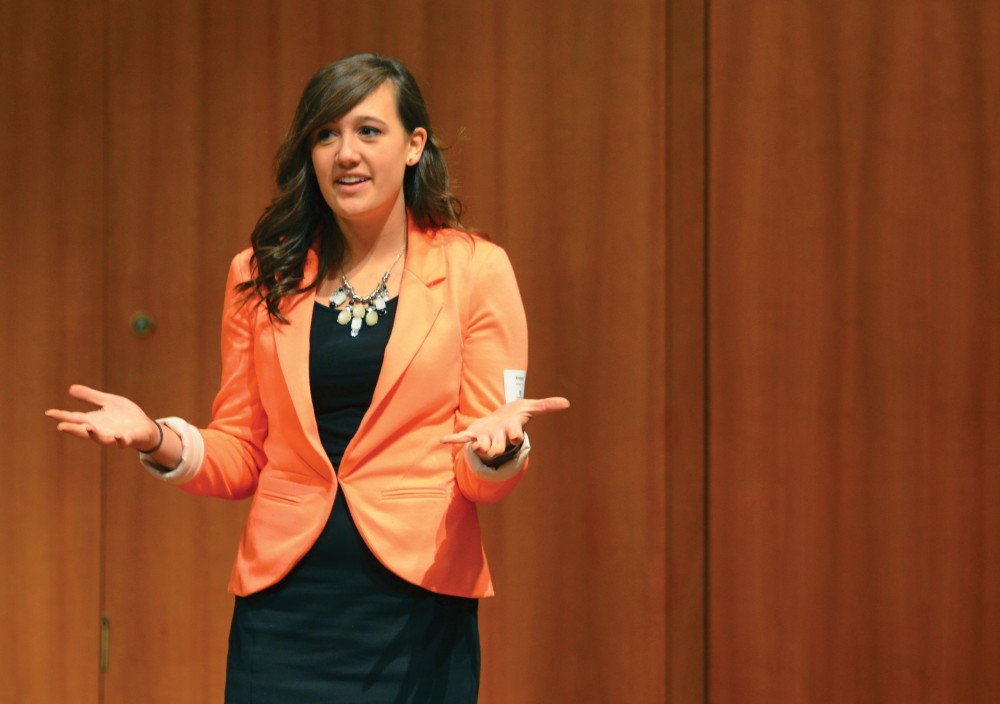Anything goes

GVL/Nathan Kalinowski Junior Kristen King at Idea Pitch presenting her idea.
Oct 23, 2013
Students pitch ideas, earn money
About 40 people gathered Monday to hear students pitch business models and products at Grand Valley State University’s ninth annual Idea Pitch Competition, which is sponsored by the Collegiate Entrepreneurs’ Organization.
Ideas presented at the competition ranged from a product that would allow moviegoers to better saturate their popcorn with butter to a smart refrigerator that would allow tech-savvy homeowners to automatically sync their refrigerators to their Apple products.
But the winning idea came from two mechanical engineering seniors, earning them a grand total of $1,000.
Jake Dykstra and Matt Freundl drew on their experience as welders to develop an idea to create a piece of technology that would make it easier for welders to see measurements needed to do their job well. The technology would be inserted into masks that welders already owned.
“While a welder is working, they can’t easily look at the measurements they need to because of the masks they wear,” Dykstra said. “They often have to stop what they’re working on.”
Freundl, the more inexperienced welder of the pair, was the one who came up with the idea. “I was thinking I wanted to improve something I do on a regular basis,” Freundl said.
The duo is planning to use the prize money to complete a perfectly working prototype and launch their idea into the marketplace.
Altogether, the competition gave away more than $2,000, which was furnished by the CEO club.
“We want to spread the message of entrepreneurship,” said Michael Kurley, communications officer of CEO. “We want to get students excited about building new businesses, trying new things and taking risks.”
Contestants were first divided into 28 teams consisting of one or two students, then had 90 seconds to present their ideas to a panel of five judges without using props or visual aids.
The teams were then split into two major pools of students, with five smaller groups within each pool. After the smaller groups presented, contestants were asked to stay on stage for a question and answer section with the judges.
“The winning idea doesn’t necessarily have to be feasible,” Kurley said. “The main thing is whether or not the presenter has the ability to get their idea across.”
The judges, who were local business professionals and entrepreneurs, based their decisions on the overall persuasiveness, quality and concision of the presentations.
After the two pools presented their ideas, judges chose the top six contestants, among whom was Justin Herd. Herd received $750 for his second place idea of the “only bowl a college student would ever need.”
His product was a microwaveable-safe, single-serving bowl that would more efficiently make ramen, macaroni, spaghetti and other noodle-based foods. On the bottom of the bowl would be holes that, when uncovered, could be used to strain noodles.
The third place winners, Autumn Modena and Jenna Petersen, received $500 for their idea presentation of Refutea—a tea shop that would work with local agencies to employ refugees from other countries who currently live in Grand Rapids.
“We hope to reduce, if not completely relieve, the refugees’ dependence on the government,” Modena said.
Also making the final six was Alex Wells, who presented a bike storage system that would be easier and less clunky than current systems.
“It would allow people to move their bike off the ground and out of the way without having to lift it themselves,” Wells said.
Participants are welcome to present a separate idea in future Idea Pitch Competitions, but they may not pitch the same idea twice.
President of CEO Miles Smith encouraged participants to pursue their ideas even if they did not win the competition.
“You never know what could happen,” he said.

























